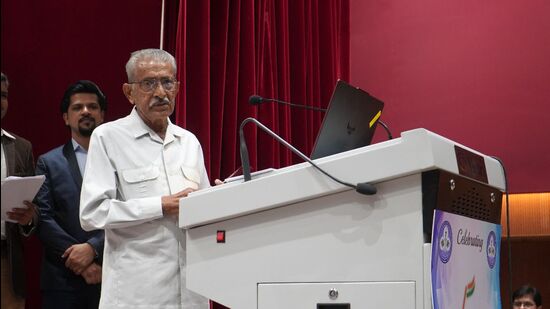PGI marks 50 years of its first kidney transplant, patients share journeys
PGIMER director Vivek Lal said, “Kidney donation rate might not be as advanced as what we would like it to be. We need to reach out, collaborate and replicate the best practices of each other to upskill, and upscale the donation rate, which is still abysmally low to meet the requirement”
Organ donation has a profound impact on the lives of individuals who were once trapped in the clutches of end-stage diseases. In a special gathering held at the NINE Auditorium, PGIMER, on Tuesday, the department of renal transplant surgery commemorated the 50th anniversary of the initiation of renal transplant surgery. During the event, recipients of organ transplants shared their journeys and experiences.

Husband ends marriage due to kidney failure
Poonam, 43, a resident of Rishikesh, received a kidney five years ago in 2018 from an 11-month-old child. Both kidneys were transplanted in her because of small size.
Poonam shared her story of adversity, recounting how she fell ill in 2010, due to high blood pressure during pregnancy, which eventually led to kidney failure.
She said she got married in 2007, but in 2015 her husband divorced her due to her debilitating disease. However, after her successful transplant, her ex-husband approached her with the offer to reconcile.
Aspiring NEET candidate hindered by kidney failure
Shalini, a 29-year-old from Panchkula, endured a five-year battle with dialysis. She was suffering from diabetes since childhood and required multiple insulin injections, which led to kidney failure. She was selected for the NEET examination but could not join due to her condition. She got a kidney and pancreas transplant in 2022. She is back to her studies and wants to join the judiciary now.
Longest survivor after kidney transplant
Sukhdev, 73, a resident of Banga, Punjab, underwent a life-transforming kidney transplant at PGI in 1985. At the age of 64, his father selflessly donated his kidney to Sukhdev. Remarkably, Sukhdev’s transplanted kidney made him the longest-surviving (37 years) recipient of a kidney transplant at PGI.
Similarly, Ravjot,8, was born with kidney disease and his kidneys completely failed when he was just three years old. He is now eight years old, living a normal life.
Dr Anil Kumar, director, National Organ & Tissue Transplant Organisation (NOTTO), who was the chief guest on the occasion, said, “The solution to organ shortage and achievement of self-sufficiency in organ donation is possible only through the systematic strengthening of the deceased donor programme.“
PGIMER director Vivek Lal said, “The donation rate might not be as advanced as what we would like it to be. We need to reach out, collaborate and replicate the best practices of each other to upskill, and upscale the donation rate, which is still abysmally low to meet the requirement.”
PGIMER conducted its first kidney transplant on June 21, 1973. Ashish Sharma, head, department of renal transplant surgery, said, “ With over 4,700 renal transplants, including both live and cadaver, PGIMER’s renal transplant programme is one of the most prolific in the country.”






